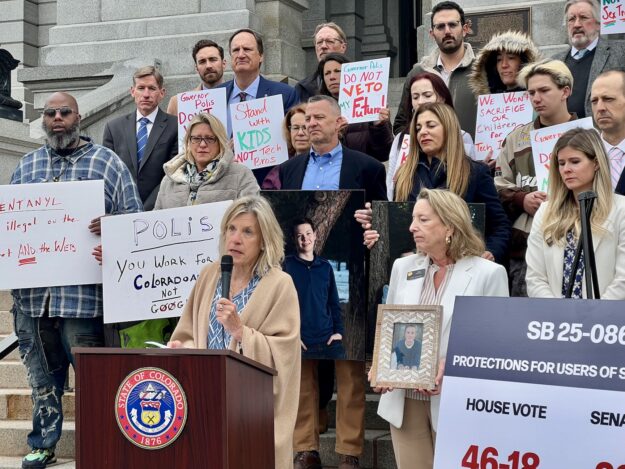Widgetized Section
Go to Admin » Appearance » Widgets » and move Gabfire Widget: Social into that MastheadOverlay zone
Colorado House won’t override Polis veto of social media drug, weapons bill

Chelsea Congdon speaks about Senate Bill 25-86 at the Colorado Capitol on April 14 (Sara Wilson/Colorado Newsline).
The Colorado House of Representatives will not vote to override Gov. Jared Polis’ veto of a bipartisan bill to regulate users who illegally sell drugs and firearms on social media platforms.
The chamber voted 51-13 on Monday afternoon to lay over the override vote until May 9, which is after the legislative session ends. That means the veto will stand and the bill will not become law.
“We have accepted the fact that the governor has exercised his authority to veto this bill, that the Senate has exercised their constitutional authority to override that veto, and that today, the votes are not here in this chamber to do the same. That is a statement of fact,” bill sponsor Rep. Andrew Boesenecker, a Fort Collins Democrat, said.
He said he would bring the bill back in the future.
Senate Bill 25-86 aimed to protect vulnerable young people from predatory social media users who try to sexually exploit them online or sell them drugs or guns. It would have required social media companies, such as X and Meta, to investigate and remove users they determine violate policies around those behaviors. It also would have required companies to hand over related materials to law enforcement within three days of a request.
The bill originally passed the Senate on a 29-6 vote and the House on a 46-18. Polis, a Democrat, vetoed the bill last week, but the Senate voted to override the veto, which requires a two-thirds majority from both chambers. The House would have needed 43 votes to override.
If successful, it would have been the first override against a Polis veto.
“This law imposes sweeping requirements that social media platforms, rather than law enforcement, enforce state law,” Polis wrote in his veto letter. “It mandates a private company to investigate and impose the government’s chosen penalty of permanently deplatforming a user even if the underlying complaint is malicious and unwarranted. In our judicial proceedings, people receive due process when they are suspected of breaking the law. This bill, however, conscripts social media platforms to be judge and jury when users may have broken the law or even a company’s own content rules.”
Polis said he looks forward to working with lawmakers to achieve the bill’s goals, but he said “the approach set forth in SB25-086 risks undermining efforts to protect the right of free speech and dissent, and empowers social media companies with police-like powers to make or break someone’s lives and livelihood in a time when free expression is absolutely critical.”
Groups from across the political spectrum, including the ACLU, Working Families Party and Rocky Mountain Gun Owners, urged Polis to veto the bill, primarily on First Amendment concerns.
Bill supporters saw it as a way to protect children who use social media. If a person sold drugs to young people near their school, they would be punished, they argue, and social media is the modern equivalent of that scenario.
Polis also vetoed a bill that would set a different timeline for open records request responses for non-journalists. Sponsors have floated trying to override that veto as well, but the Senate delayed a vote on it until later this week. The legislative session ends May 7.
Editor’s note: This story first appeared on Colorado Newsline, which is part of States Newsroom, a nonprofit news network supported by grants and a coalition of donors as a 501c(3) public charity. Colorado Newsline maintains editorial independence. Contact Editor Quentin Young for questions: info@coloradonewsline.com.


